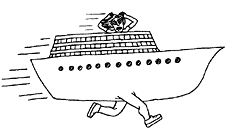Movies
Hercules (Disney). The studio's newest feature-length cartoon outstrips even The Lion King (1994) in sheer promotional hype: a Fifth Avenue parade, fireworks over the Hudson, as well as the usual McDonald's and cereal-box tie-ins. "This time," however, says the New York Times' Janet Maslin, "the film is worth the fuss." Critics praise it for bucking Disney's musical-comedy formula: It's full of self-conscious humor (jokes about a glut of Hercules merchandise) and employs gospel music instead of the usual treacly pop tunes. And by making Hercules a sports star and another character a Hollywood agent, the movie proves that "Walt's art form is still sassy and snazzy" (Richard Corliss, Time). (Disney serves up tie-ins galore on its site.)

Speed 2: Cruise Control (20th Century Fox). The sequel to the 1994 smash hit--this time set on a runaway luxury liner instead of a runaway bus--is ridiculed as an inferior knockoff. "What a reeking bag of nothingness!" says the Washington Post's Stephen Hunter. Among its faults: inane characters, incoherent plot, lack of suspense, and self-knowing allusions to the original. The film contains, says Newsday's Jack Mathews in a typical pan, "not one single exhilarating scene or enticing idea."
My Best Friend's Wedding (Sony Pictures). Julia Roberts is back--albeit to mixed reviews--as a malicious schemer intent on thwarting her ex-lover's engagement. Several critics praise Roberts for achieving new heights of meanness. Newsweek's David Ansen, for one, says she raises interesting questions for a Hollywood romantic comedy--"Should we be rooting for her?"--and puts "new fizz in an old form." The New Yorker's Terrence Rafferty differs, denouncing the film's "killjoy moralism": It "isn't at all the sort of spectacle that audiences for romantic comedies expect, or deserve." (Stills, clips, etc., are available at the movie's site.)
Architecture
Shakespeare's Globe Theatre (London). Plaudits for the reconstruction of the fabled Elizabethan theater, which was demolished in 1644. The new building, on the Thames' south bank and 50 yards from the original, is praised for its authenticity: harsh wooden benches, vendors selling wine during soliloquies, costumes made using 17th-century methods. The cramped 1,000-seat theater makes it seem as if actors "are talking to you, asking you questions, involving you in their fears. ... Isn't that what theatre is all about?" (Benedict Nightingale, the London Times). However, some critics dismiss the project as a corny, nostalgia-heavy tourist trap, "an Elizabethan theme park" (Roy Hattersley, the Guardian). (Click here for the Globe's site.)

Books
News of a Kidnapping, by Gabriel García Márquez, translated from the Spanish by Edith Grossman (Knopf). The Nobel Prize-winning novelist's foray into journalism--an account of his fellow Colombian, the late coke kingpin Pablo Escobar--puzzles critics. García Márquez earns praise for his reporting, which demonstrates, says Robert Stone in the New York Times Book Review, "a quick eye for the illuminating detail and a capacity for assembling fact." But others lament the absence of the novelist's trademarks--the magical realism, the stylish prose, the irony. And the Los Angeles Times' Michael Massing says the book, which is uncritical of the often brutal Escobar, lacks a "moral center ... he seems clearly taken with the man."
The Diving Bell and the Butterfly, by Jean-Dominique Bauby, translated from the French by Jeremy Leggatt (Knopf). Critics find this memoir by the late editor of French Elle extremely poignant--but mainly because of its method of composition. Bauby, who was almost completely paralyzed by a stroke, dictated the book letter by letter, blinking his left eyelid as someone read through the alphabet over and over. "[A] book as moving as Job's" (Thomas Mallon, the New York Times Book Review). "[B]eguilingly poetic" (Albert Mobilio, the Village Voice). As they invariably do with art by and/or about invalids, critics grandiloquently pronounce the book a "testament to the human spirit" (Malcolm Jones Jr., Newsweek). (Click here for excerpts.)
The God of Small Things, by Arundhati Roy (Random House). No less than John Updike (in The New Yorker's fiction issue) proclaims the screenwriter-architect's first novel "a Tiger Woodsian début." Other reviews echo the enthusiasm, comparing her tale of an aristocratic Indian family in decline to the work of Rushdie, Faulkner, and Dickens. Roy's inventive narrative style (multiple flashbacks, rotating narrators) and "the exuberant, almost acrobatic nature of the writing itself" (Alice Truax, the New York Times Book Review) are singled out as breathtaking. Dissenting is the Los Angeles Times' Richard Eder, who says Roy "inflates story into epic, the modest magic of perception into an occasional clumsy piece of magic realism."
The Perfect Storm, by Sebastian Junger (W.W. Norton & Co.). Raves for this chronicle of the 1991 "storm of the century" that swallowed up a boatload of New England fishermen. Just published and already a best seller, The Perfect Storm is said to be "thrilling--a boat ride into and (for us) out of a watery hell" (Anthony Bailey, the New York Times Book Review). Reviews cite the book's eclecticism: It combines a lucid explanation of the storm's complex meteorology, gritty descriptions of sailor bars and, most compellingly, a reconstruction of the ship's final minutes. "Junger is grimly precise about the mechanics of drowning," says Time's John Skow. (Norton plugs the book here.)
Art
"Venice Biennale" (Venice, Italy). Despite a lineup of big-name talent--including Roy Lichtenstein, Jeff Koons, and Claus Oldenberg--the world's most prestigious contemporary art exhibition fails to excite. The show "lacks insight and inspiration," says the New York Times' Roberta Smith. Others complain that the superstars are over the hill, and are trotting out mediocre work. One bright spot: Robert Colescott, the first African-American artist at Venice, whose paintings, which transform images from Van Gogh and Picasso into sendups of racial stereotypes, are said to add "some spice" to an otherwise "sleepy biennal" (Holland Cotter, the New York Times).
Update
More derision for Promiscuities, Naomi Wolf's tract about female sexuality. In the New York Observer, Francine Prose says Wolf's "methodology makes Shere Hite look like Louis Pasteur," and in her New York Times column, Maureen Dowd observes that the book reveals "that women like men and that they like to be touched. Well, duh." See also Sarah Kerr's review this week in Slate.
Recent "Summary Judgment" columns
Movie--Con Air;
Movie--Ulee's Gold;
Movie--The Pillow Book;
Music--Wu-Tang Forever, Wu-Tang Clan;
Book--Without a Doubt, by Marcia Clark, with Teresa Carpenter;
Book--Firewall: The Iran-Contra Conspiracy and Cover-Up, by Lawrence E. Walsh;
Book--Promiscuities: The Secret Struggle for Womanhood, by Naomi Wolf;
Theater--Gross Indecency: The Three Trials of Oscar Wilde.
Movie--Trial and Error;
Music--Blood on the Dance Floor--HIStory in the Mix, Michael Jackson;
Television--Bill Clinton: Rock & Roll President (VH1);
Television--Port Charles (ABC);
Book--Race, Crime, and the Law, by Randall Kennedy;
Book--Virginia Woolf, by Hermione Lee;
Book--Kowloon Tong, by Paul Theroux;
Event--The Tony Awards;
Art--"Objects of Desire: The Modern Still Life" (Museum of Modern Art).
Movie--The Lost World;
Movie--Addicted to Love;
Movie--Brassed Off;
Television--Murder One (ABC);
Theater--King David;
Music--Flaming Pie, by Paul McCartney;
Book--Che Guevara: A Revolutionary Life, by Jon Lee Anderson;
Book--Rage for Fame: The Ascent of Clare Boothe Luce, by Sylvia Jukes Morris;
Art--New Chinese Galleries (Metropolitan Museum of Art).
Book--Underboss: Sammy the Bull Gravano's Story of Life in the Mafia, by Peter Maas;
Book--The Actual: A Novella, by Saul Bellow;
Television--Roseanne (ABC);
Television--David Blaine: Street Magic (ABC);
Event--Cannes International Film Festival;
Movie--Night Falls on Manhattan;
Movie--Love! Valour! Compassion!;
Theater--The Wizard of Oz.
--Compiled by Franklin Foer and the editors of Slate.
